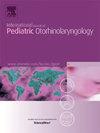Social determinants of health and effectiveness of social work support in a pediatric aerodigestive program
IF 1.3
4区 医学
Q3 OTORHINOLARYNGOLOGY
International journal of pediatric otorhinolaryngology
Pub Date : 2025-07-01
DOI:10.1016/j.ijporl.2025.112459
引用次数: 0
Abstract
Background
Social determinants of health (SDOH) significantly influence the well-being of families in pediatric aerodigestive programs, affecting engagement with care, adherence to treatment, and overall health outcomes. This study evaluated the impact of SDOH and the effectiveness of social work support for families within a multidisciplinary aerodigestive program.
Methods
A mixed-methods study was conducted at Ann & Robert H. Lurie Children's Hospital of Chicago using a convenience sample of patients discharged between July and August 2023. Data were collected through a condensed SDOH screening questionnaire, qualitative interviews, social work documentation, and chart reviews. Thematic analysis was used to identify recurring challenges and assess social work interventions.
Results
Among 17 interviewed families, the majority of patients were Black (47.1 %) and male (56.3 %), with a mean age of 9.5 years. Key SDOH challenges included financial strain (62.5 %), caregiver stress (37.5 %), transportation barriers (31.3 %), food insecurity (25 %), and housing instability (12.5 %). Four major themes emerged: insufficient post-discharge support, the value of peer-family connections, the need for coordinated care, and the importance of aerodigestive-specific social work support.
Conclusions
Families in pediatric aerodigestive programs face substantial SDOH-related barriers. Strengthening relationship-centered care, enhancing care coordination, and embedding longitudinal, program-specific social work support may improve outcomes and reduce caregiver burden.
儿童空气消化项目中社会工作支持的健康和有效性的社会决定因素
背景:健康的社会决定因素(SDOH)显著影响儿科气消化项目中家庭的幸福感,影响对护理的参与、对治疗的坚持和整体健康结果。本研究在一个多学科的气消化项目中评估了SDOH的影响和社会工作对家庭支持的有效性。方法采用混合方法在Ann &;芝加哥罗伯特·h·卢里儿童医院使用了2023年7月至8月出院的病人的方便样本。数据收集通过一个浓缩的SDOH筛选问卷,定性访谈,社会工作文件,和图表回顾。专题分析用于确定反复出现的挑战并评估社会工作干预措施。结果17个受访家庭中,黑人(47.1%)和男性(56.3%)居多,平均年龄9.5岁。SDOH面临的主要挑战包括财政压力(62.5%)、照顾者压力(37.5%)、交通障碍(31.3%)、粮食不安全(25%)和住房不稳定(12.5%)。出现了四个主要主题:出院后支持不足,同伴家庭联系的价值,协调护理的需要,以及特定于消化系统的社会工作支持的重要性。结论儿童气消化项目的家庭面临着大量与sdoh相关的障碍。加强以关系为中心的护理,加强护理协调,并嵌入纵向的、特定于项目的社会工作支持,可以改善结果并减轻护理人员的负担。
本文章由计算机程序翻译,如有差异,请以英文原文为准。
求助全文
约1分钟内获得全文
求助全文
来源期刊
CiteScore
3.20
自引率
6.70%
发文量
276
审稿时长
62 days
期刊介绍:
The purpose of the International Journal of Pediatric Otorhinolaryngology is to concentrate and disseminate information concerning prevention, cure and care of otorhinolaryngological disorders in infants and children due to developmental, degenerative, infectious, neoplastic, traumatic, social, psychiatric and economic causes. The Journal provides a medium for clinical and basic contributions in all of the areas of pediatric otorhinolaryngology. This includes medical and surgical otology, bronchoesophagology, laryngology, rhinology, diseases of the head and neck, and disorders of communication, including voice, speech and language disorders.

 求助内容:
求助内容: 应助结果提醒方式:
应助结果提醒方式:


